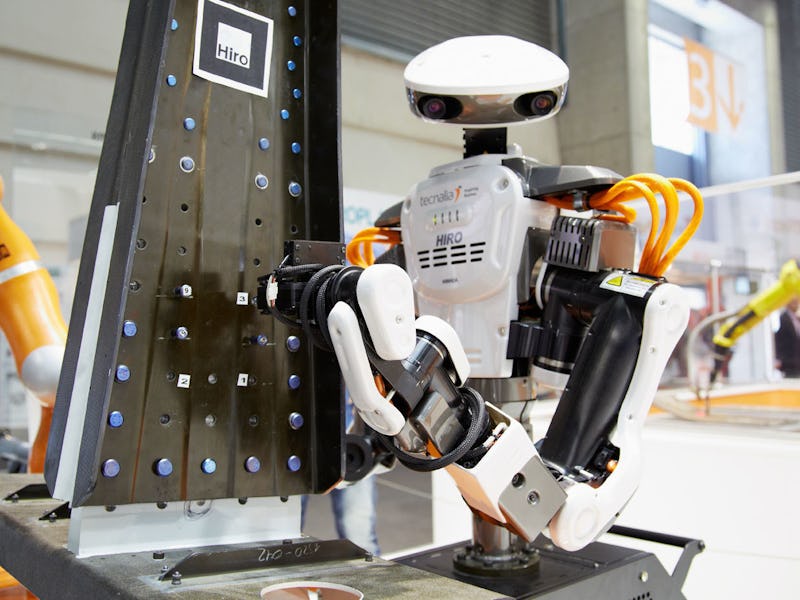How to Know if a Robot Will Steal Your Job or Help You With It
It's all about becoming more human.

In an age of robotic revolution, the possibilities for automation are endless. Robots can deliver room service to you, haul a package to you from across the country, farm for your food and cook it, perform heart surgery on you, and even screw you, all seemingly without any assistance from humans.
It may seem like the world is entering a post-work era where robots outnumber humans and do just about everything for them. But, before you get ahead of yourself, consider this: when a robot comes after your job, will you find a way to work with it?
The jobs that are most at-risk
A 2013 paper from the University of Oxford aimed to see how threatened the U.S. job market truly is. First, they categorized a list of 702 specific occupations that range from highly technical careers like financing and engineering, to creative careers like education and media, to labor intensive careers like farming and construction. Then they devised a method using the Gaussian classification process (a statistical model that looks at data and distributes it over a set of variables) to calculate how susceptible each job was to a technology takeover. What they found was that a staggering 47 percent of U.S. employment is at risk.
The most at-risk jobs are as follows: transportation and material moving, production, installation, maintenance and repair, construction and extraction, farming, fishing, forestry, office and administrative work, sales, and service jobs. In total, that covers about 65 million careers that could be replaced by computerized technology in the next few decades. That, understandably, is worrying for a lot of people.
Andrew McAfee, an economist at MIT, and co-author of The Second Machine Age: Work, Progress, and Prosperity in a Time of Brilliant Technologies, says the best way to know if your job is going to be computerized is to ask yourself: is it routine? Is there some kind of pattern in the work you are doing?
“Take medical diagnosis, for example. It’s a pattern-matching exercise,” McAfee tells Inverse. “We used to need very intelligent, very well-trained people called doctors to do that medical diagnostic work. And now, we have technologies that are really, really good at it.”
When something as complex as medical diagnosing becomes automated, it may be difficult to see how humans fit into the equation. But, McAfee assures that humans are still far more advanced than machines in a number of ways.
“Medical diagnosing can be very automated. But, getting someone to understand their diagnosis, to accept it, to go along with the treatment plan is entirely different work. To do that work well, you need compassion; you need to be able to tap into somebody’s emotional drives and form a bond with them to make sure they are sticking with the treatment. Humans are still far better than machines at doing that.”
What can humans do to prepare?
It seems the robot takeover has already begun. If you think your job is safe, you should probably think twice. But, there are ways you can catch up by focusing your very humanity.
It used to be that all you needed to succeed was a high school diploma, then, as automation targeted factories, it became a college degree. But, now, humans don’t even need traditional knowledge to succeed. In today’s world, it’s all about becoming more human and less robotic.
“I would like to see our education system emphasize the places where we are still lousy like problem-solving and asking what’s next,” McAfee says. “Or working in teams or being trained to have very advanced social skills. Machines can’t do all of that yet.”
As McAfee suggests, there are courses online, workshops, and materials, that can take your education to the next, more futuristic, level. It’s no longer about getting a costly degree at an Ivy League school.
“Don’t do what my generation thought: that going to school and getting a degree is some kind of coupon that you exchange for a job. That might have been a decent way to think about it a generation ago. But, I think that’s a pretty lousy way to think about it now,” he said. “So, be mindful about your education, are you actually acquiring skills that will be valuable in the economy of tomorrow. Never ever think your education has stopped.”
Will we ever reach a post-work world?
As computers become more and more advanced and integrated into human life, work may one day become obsolete altogether. Living in a Jetsons-like age where the work week is condensed to just two hours while the economy flourished because robots are doing all the labor is a fantasy many dream of as they clock in and out of their nine-to-fives, but what is the reality of this idea?
“The engine of enterprise always destroys industries, and companies, and jobs and always creates new industries, and companies, and jobs,” he said. “The destruction is usually easier to see and predict than the creation. But the idea that robots will be putting us all out of work in the next couple decades is really facetious. Never stop acquiring skills and recognize that there will be plenty of opportunities created.”
Instead of being afraid of the robot takeover, maybe it’s worth being excited, albeit cautiously. Society has tended to get better on the whole when machines step in to do some of the work. The newfound efficiency allows for more creativity and innovation and new possibilities. There might not be anything you can do about the machines, but there’s a whole lot you can do with them.